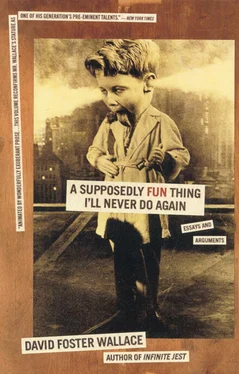1990
E UNIBUS PLURAM television and U.S. fiction
act natural
Fiction writers as a species tend to be oglers. They tend to lurk and to stare. They are born watchers. They are viewers. They are the ones on the subway about whose nonchalant stare there is something creepy, somehow. Almost predatory. This is because human situations are writers’ food. Fiction writers watch other humans sort of the way gapers slow down for car wrecks: they covet a vision of themselves as witnesses .
But fiction writers tend at the same time to be terribly self-conscious. Devoting lots of productive time to studying closely how people come across to them, fiction writers also spend lots of less productive time wondering nervously how they come across to other people. How they appear, how they seem, whether their shirttail might be hanging out of their fly, whether there’s maybe lipstick on their teeth, whether the people they’re ogling can maybe size them up as somehow creepy, as lurkers and starers.
The result is that a majority of fiction writers, born watchers, tend to dislike being objects of people’s attention. Dislike being watched. The exceptions to this rule — Mailer, McInerney — sometimes create the impression that most belletristic types covet people’s attention. Most don’t. The few who like attention just naturally get more attention. The rest of us watch.
Most of the fiction writers I know are Americans under 40. I don’t know whether fiction writers under 40 watch more television than other American species. Statisticians report that television is watched over six hours a day in the average American household. I don’t know any fiction writers who live in average American households. I suspect Louise Erdrich might. Actually I have never seen an average American household. Except on TV.
Right away you can see a couple of things that look potentially great, for U.S. fiction writers, about U.S. television. First, television does a lot of our predatory human research for us. American human beings are a slippery and protean bunch in real life, hard as hell to get any kind of universal handle on. But television comes equipped with just such a handle. It’s an incredible gauge of the generic. If we want to know what American normality is — i.e. what Americans want to regard as normal — we can trust television. For television’s whole raison is reflecting what people want to see. It’s a mirror. Not the Stendhalian mirror that reflects the blue sky and mudpuddle. More like the overlit bathroom mirror before which the teenager monitors his biceps and determines his better profile. This kind of window on nervous American self-perception is simply invaluable in terms of writing fiction. And writers can have faith in television. There is a lot of money at stake, after all; and television owns the best demographers applied social science has to offer, and these researchers can determine precisely what Americans in the 1990s are, want, see — what we as Audience want to see ourselves as. Television, from the surface on down, is about desire. And, fiction-wise, desire is the sugar in human food.
The second great-seeming thing is that television looks to be an absolute godsend for a human subspecies that loves to watch people but hates to be watched itself. For the television screen affords access only one-way. A psychic ball-check valve. We can see Them; They can’t see Us. We can relax, unobserved, as we ogle. I happen to believe this is why television also appeals so much to lonely people. To voluntary shut-ins. Every lonely human I know watches way more than the average U.S. six hours a day. The lonely, like the fictive, love one-way watching. For lonely people are usually lonely not because of hideous deformity or odor or obnoxiousness — in fact there exist today support- and social groups for persons with precisely these attributes. Lonely people tend, rather, to be lonely because they decline to bear the psychic costs of being around other humans. They are allergic to people. People affect them too strongly. Let’s call the average U.S. lonely person Joe Briefcase. Joe Briefcase fears and loathes the strain of the special self-consciousness which seems to afflict him only when other real human beings are around, staring, their human sense-antennae abristle. Joe B. fears how he might appear, come across, to watchers. He chooses to sit out the enormously stressful U.S. game of appearance poker.
But lonely people, at home, alone, still crave sights and scenes, company. Hence television. Joe can stare at Them on the screen; They remain blind to Joe. It’s almost like voyeurism. I happen to know lonely people who regard television as a veritable deus ex machina for voyeurs. And a lot of the criticism, the really rabid criticism less leveled than sprayed at networks, advertisers, and audiences alike, has to do with the charge that television has turned us into a nation of sweaty, slack-jawed voyeurs. This charge turns out to be untrue, but it’s untrue for interesting reasons.
What classic voyeurism is is espial, i.e. watching people who don’t know you’re there as those people go about the mundane but erotically charged little businesses of private life. It’s interesting that so much classic voyeurism involves media of framed glass — windows, telescopes, etc. Maybe the framed glass is why the analogy to television is so tempting. But TV-watching is different from genuine Peeping-Tomism. Because the people we’re watching through TV’s framed-glass screen are not really ignorant of the fact that somebody is watching them. In fact a whole lot of somebodies. In fact the people on television know that it is by virtue of this truly huge crowd of ogling somebodies that they are on the screen engaging in broad non-mundane gestures at all. Television does not afford true espial because television is performance, spectacle, which by definition requires watchers. We’re not voyeurs here at all. We’re just viewers. We are the Audience, megametrically many, though most often we watch alone: E Unibus Pluram. 1
One reason fiction writers seem creepy in person is that by vocation they really are voyeurs. They need that straightforward visual theft of watching somebody who hasn’t prepared a special watchable self. The only illusion in true espial is suffered by the voyee, who doesn’t know he’s giving off images and impressions. A problem with so many of us fiction writers under 40 using television as a substitute for true espial, however, is that TV “voyeurism” involves a whole gorgeous orgy of illusions for the pseudo-spy, when we watch. Illusion (1) is that we’re voyeurs here at all: the “voyees” behind the screen’s glass are only pretending ignorance. They know perfectly well we’re out there. And that we’re there is also very much on the minds of those behind the second layer of glass, viz. the lenses and monitors via which technicians and arrangers apply enormous ingenuity to hurl the visible images at us. What we see is far from stolen; it’s proffered — illusion (2). And, illusion (3), what we’re seeing through the framed panes isn’t people in real situations that do or even could go on without consciousness of Audience. I.e., what young writers are scanning for data on some reality to fictionalize is already composed of fictional characters in highly formalized narratives. And, (4), we’re not really even seeing “characters” at all: it’s not Major Frank Burns, pathetic self-important putz from Fort Wayne, Indiana; it’s Larry Linville of Ojai, California, actor stoic enough to endure thousands of letters (still coming in, even in syndication) from pseudo-voyeurs berating him for being a putz from Indiana. And then (5) it’s ultimately of course not even actors we’re espying, not even people: it’s EM-propelled analog waves and ion streams and rear-screen chemical reactions throwing off phosphenes in grids of dots not much more lifelike than Seurat’s own Impressionist commentaries on perceptual illusion. Good Lord and (6) the dots are coming out of our furniture , all we’re really spying on is our own furniture , and our very own chairs and lamps and bookspines sit visible but unseen at our gaze’s frame as we contemplate “Korea” or are taken “live to Jerusalem” or regard the plusher chairs and classier spines of the Huxtable “home” as illusory cues that this is some domestic interior whose membrane we have (slyly, unnoticed) violated — (7) and (8) and illusions ad inf.
Читать дальше












